Association between high blood pressure and long term cardiovascular events in young adults: systematic review and meta-analysis
- PMID: 32907799
- PMCID: PMC7478061
- DOI: 10.1136/bmj.m3222
Association between high blood pressure and long term cardiovascular events in young adults: systematic review and meta-analysis
Abstract
Objective: To evaluate and quantify the future risk of cardiovascular events in young adults with high blood pressure.
Design: Systematic review and meta-analysis.
Data sources: Medline, Embase, and Web of Science were searched from inception to 6 March 2020. Relative risks were pooled using a random effects model and expressed with 95% confidence intervals. Absolute risk difference was calculated. Dose-response relations between blood pressure and individual outcomes were assessed by a restricted cubic spline model.
Eligibility criteria for selecting studies: Studies were selected that investigated the adverse outcomes of adults aged 18-45 with raised blood pressure. The primary study outcome was a composite of total cardiovascular events. Coronary heart disease, stroke, and all cause mortality were examined as secondary outcomes.
Results: Seventeen observational cohorts consisting of approximately 4.5 million young adults were included in the analysis. The average follow-up was 14.7 years. Young adults with normal blood pressure had increased risk of cardiovascular events compared with those with optimal blood pressure (relative risk 1.19, 95% confidence interval 1.08 to 1.31; risk difference 0.37, 95% confidence interval 0.16 to 0.61 per 1000 person years). A graded, progressive association was found between blood pressure categories and increased risk of cardiovascular events (high normal blood pressure: relative risk 1.35, 95% confidence interval 1.22 to 1.49; risk difference 0.69, 95% confidence interval 0.43 to 0.97 per 1000 person years; grade 1 hypertension: 1.92, 1.68 to 2.19; 1.81, 1.34 to 2.34; grade 2 hypertension: 3.15, 2.31 to 4.29; 4.24, 2.58 to 6.48). Similar results were observed for coronary heart disease and stroke. Generally, the population attributable fraction for cardiovascular events associated with raised blood pressure was 23.8% (95% confidence interval 17.9% to 28.8%). The number needed to treat for one year to prevent one cardiovascular event was estimated at 2672 (95% confidence interval 1639 to 6250) for participants with normal blood pressure, 1450 (1031 to 2326) for those with high normal blood pressure, 552 (427 to 746) for those with grade 1 hypertension, and 236 (154 to 388) for those with grade 2 hypertension.
Conclusions: Young adults with raised blood pressure might have a slightly increased risk of cardiovascular events in later life. Because the evidence for blood pressure lowering is limited, active interventions should be cautious and warrant further investigation.
© Author(s) (or their employer(s)) 2019. Re-use permitted under CC BY-NC. No commercial re-use. See rights and permissions. Published by BMJ.
Conflict of interest statement
Competing interests: All authors have completed the ICMJE uniform disclosure form at www.icmje.org/coi_disclosure.pdf and declare: support from the National Natural Science Foundation of China, Guangdong Province Natural Science Foundation, Science and Technology Planning Project of Guangdong Province, Science and Technology Program of Guangzhou, and High-level Hospital Construction Project for the submitted work; no financial relationships with any organisations that might have an interest in the submitted work in the previous three years; no other relationships or activities that could appear to have influenced the submitted work.
Figures

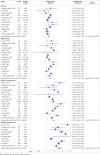
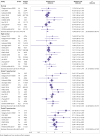
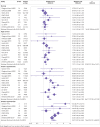

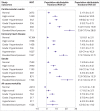
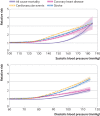
Comment in
-
Blood pressure targets for young adults: are we being too stringent?BMJ. 2020 Oct 9;371:m3910. doi: 10.1136/bmj.m3910. BMJ. 2020. PMID: 33037000 No abstract available.
References
-
- GBD 2017 Causes of Death Collaborators Global, regional, and national age-sex-specific mortality for 282 causes of death in 195 countries and territories, 1980-2017: a systematic analysis for the Global Burden of Disease Study 2017. Lancet 2018;392:1736-88. 10.1016/S0140-6736(18)32203-7. - DOI - PMC - PubMed
-
- Whelton PK, Carey RM, Aronow WS, et al. 2017 ACC/AHA/AAPA/ABC/ACPM/AGS/APhA/ASH/ASPC/NMA/PCNA guideline for the prevention, detection, evaluation, and management of high blood pressure in adults: executive summary: a report of the American College of Cardiology/American Heart Association Task Force on Clinical Practice Guidelines. Circulation 2018;138:e426-83. 10.1161/CIR.0000000000000597. - DOI - PubMed
Publication types
MeSH terms
LinkOut - more resources
Full Text Sources
Medical
